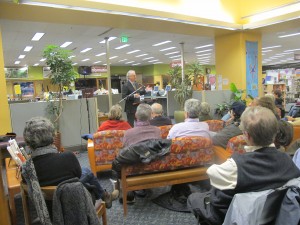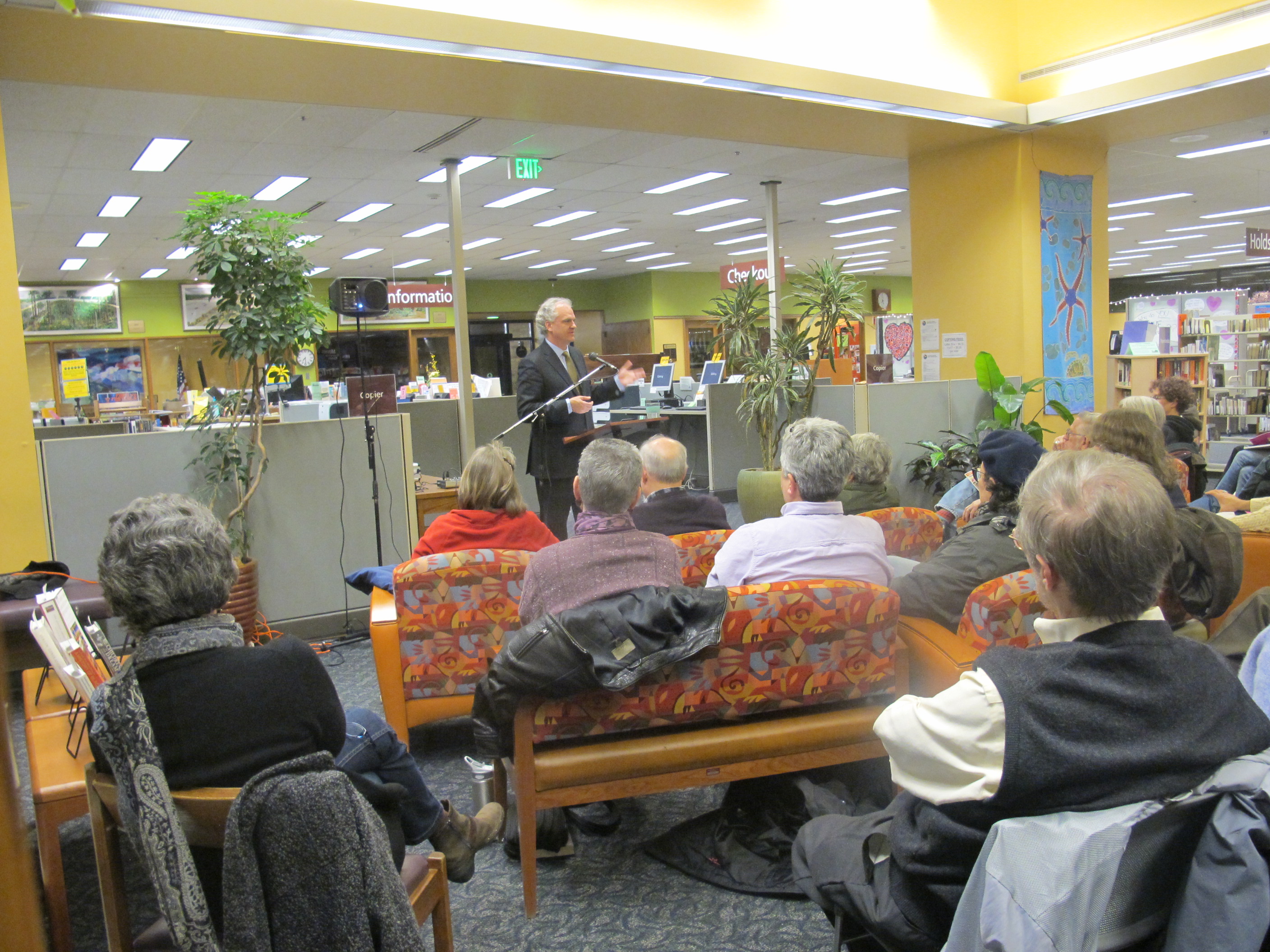By Eliza Ramsey, Capital High School intern to ThurstonTalk
 On the evening of February 22, Douglas Blackmon, author of Slavery by Another Name: The Re-Enslavement of Black Americans from the Civil War to World War II, spoke to an audience of approximately 60 at the Olympia Timberland Library about issues of race and history. The book, published in 2009, won a Pulitzer Prize for General Non-Fiction. It was also adapted into a PBS special by the same name which originally aired in February 2012 and is airing again this month.
On the evening of February 22, Douglas Blackmon, author of Slavery by Another Name: The Re-Enslavement of Black Americans from the Civil War to World War II, spoke to an audience of approximately 60 at the Olympia Timberland Library about issues of race and history. The book, published in 2009, won a Pulitzer Prize for General Non-Fiction. It was also adapted into a PBS special by the same name which originally aired in February 2012 and is airing again this month.
In Slavery by Another Name, Blackmon details a little known 80-year period of history following the Emancipation Proclamation of 1863 in which slavery essentially continued to exist in the American South. Blacks were arrested on often false or trumped up charges. Then, unable to pay steep court fees they were sold to corporations who paid their debt in exchange for labor. Taken to mines, farms and factories these black laborers worked under horrific conditions. Many never lived a free life again, dying of disease and exhaustion.
Growing up in Leland, MS in the Mississippi Delta in the 1960s, Blackmon often had a front row view of continuing racial tensions. Attending public school, he was part of one the first integrated classes. He credits his young fascination with the complexities of race relations with helping spark his interest in the topic of his book. Blackmon began the almost eight year journey to write his book with an article in the Wall Street Journal, where he served as a reporter and later as the Atlanta Bureau Chief. Blackmon wrote the book to tell the story of an often overlooked period in history in which hundreds of thousands of blacks continued to essentially be employed as slaves long after the 13th Amendment abolished slavery.
Blackmon found that this return of slavery-like practices was caused by a mix of social and economic conditions. The southern economy, and the national economy, suffered greatly in the first years of Reconstruction because of a lack of cheap labor to staff the agriculturally based South. “They simply couldn’t figure out how to make the economy work without forced laborers and the whole country was terribly damaged by that,” said Blackmon. In a coordinated effort between the judicial system and industry, the practice of rounding up black men and selling them into servitude in exchange for paying off court fees filled that labor gap. It was also found that this practice was cohesive in securing a social agenda that repressed the advancement of black Americans. “There was a realization that it was also a really effective way of intimidating people, to stop them from voting, to keep them from exercising certain rights,” stated Blackmon.
Traveling to local courthouses across the South, Blackmon discovered cases of black men arrested for crimes of vagrancy, walking beside a rail line and other dubious laws. “Some of these charges were absolutely made up, and there were times that I found a telegram would be sent to a sheriff in a particular place that said ‘you need to round up a lot of these guys and a labor agent will be there on Monday.’”
In his talk at the Olympia Timberland Library branch, Blackmon focused on the importance of remembering and understanding history, “The value of history is that almost every major problem or issue we face in current life, there’s some sort of historical understanding, there is some element of history that if we understand it we’re more likely to understand what it is we’re facing now,” said Blackmon.
Earlier in the day on Friday, Blackmon stopped by the 6th period AP U.S. History Class of Mr. Schaefer at Olympia High School where his niece Grace Blackmon is a senior. In talking with the students Blackmon stressed the importance of understanding history, “I explained the premise of the book and the last thing I talked about was how all of this is related to mass-incarceration and the defects in our judicial system today.”
Blackmon is beginning work on a second book, one on his memories of growing up in Leland and the complex racial history of the town. Blackmon plans to explore the role history played in shaping the town’s existence today, “the past will always be persistent, because history is where the answers lie.”

















































